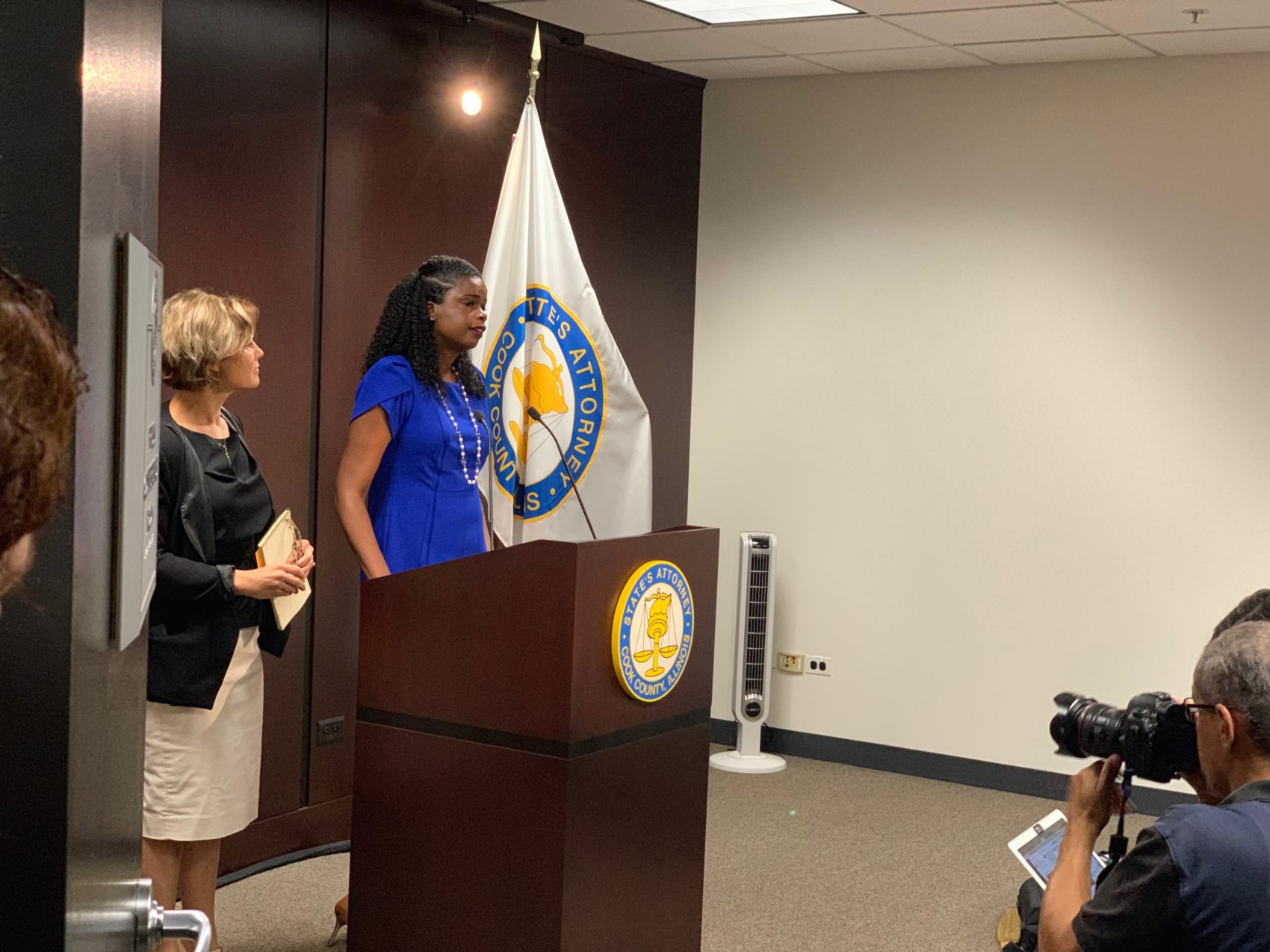Chicago’s Top Prosecutor: Clearing Marijuana Records Will Be ‘Life-Changing’
Cook County State’s Attorney Kim Foxx is partnering with a technology nonprofit to expunge tens of thousands of minor marijuana convictions. Other jurisdictions could follow.

For years, when Robert (not his real name), a middle-aged man in the Chicago suburbs, applied for jobs, he had to make a difficult choice. He had to decide whether to tell the truth about his marijuana conviction when he filled out an application, explained Pastor Charles Straight, a leader of The People’s Lobby who met Robert through church. Telling the truth could cost him the job, but if he lied, he had to hope the employer wouldn’t run a background check and discover the conviction.
“He had no criminal intent,” Straight said. “He ended up in a very difficult place, doing odd jobs … And that’s a situation where so many poor, young people are caught.”
But for Cook County residents with minor marijuana convictions, these barriers will soon be lifted. State’s Attorney Kim Foxx announced this week that her office will be using Clear My Record technology developed by the nonprofit Code for America to automatically expunge tens of thousands of people’s convictions involving amounts of marijuana smaller than 30 grams. The move comes as the county that includes Chicago prepares to legalize the recreational use of marijuana in January, after state legislation to do so was enacted in June. State officials estimate that close to 800,000 marijuana convictions could be expunged in Illinois.
Foxx told The Appeal that she wanted to automatically clear people’s records largely because of the toll that comes with having a criminal record.
“It’s life-changing when you take away something that literally holds people back,” she said. “The collateral consequences of a conviction are far and wide: the ability to get a job, the ability to get housing, the ability to get financial aid, licensure, all because of a conviction.”
Navigating whether to disclose a past offense is particularly tricky for people convicted of marijuana-related offenses, Foxx said, because they may not have an opportunity to explain that their offense is no longer unlawful.
Under the new law, they are eligible to have their records fully expunged, meaning the convictions won’t appear in routine background checks or in law enforcement databases.
“The war on drugs has been such an abysmal failure,” Straight said. “It’s served to incarcerate hundreds of thousands of Black and brown people for just trying to survive. To be able to get a little bit of justice for them by at least expunging their records and giving them an opportunity to have a little bit more of a shot at life is a great thing.”
Four jurisdictions in California—Los Angeles, Sacramento, San Francisco, and San Joaquin counties—are using Code for America’s technology to clear roughly 75,000 marijuana convictions, according to the organization. Chicago will be the first city to use the technology outside of California, where Code for America is based.
Code for America told The Appeal that it is in conversations with “several other states” to utilize the technology to clear convictions, but could not disclose which states. “The Clear My Record program has the potential [to] be adapted to any record clearance remedy in any state,” a representative said in an email.
Eleven states and the District of Columbia have legalized small amounts of marijuana for recreational use, according to the National Conference of State Legislatures. The process for conviction expungement varies in each state, but is often difficult and puts the burden on individuals to apply. Some states have experimented with alternatives. In Washington, Governor Jay Inslee announced in January (six years after the state legalized marijuana) that instead of making people go to court, his office would create an expedited pardon process for thousands of marijuana offenders. But that process could change when he is no longer governor. And prosecutors are often opposed to expungement because they argue people were aware that their acts were illegal when they were arrested for a marijuana offense.
Foxx said she began thinking about creating a process to automatically expunge records in January, even before the Illinois legislature passed the Cannabis Regulation and Tax Act legalizing the recreational use of marijuana.
“It was serendipitous actually,” she said, explaining that her office decided to take on the “daunting task” of vacating convictions before she learned in February that Code for America could streamline the process. Once she connected with Code for America, the organization was involved in drafting the legalization bill and talking through how best to expunge records.
“We had a great idea and we married it with someone who had an infrastructure ready,” she said.
Now that the partnership has been solidified, Foxx said the next step is to get data from the Illinois State Police so that Code for America can begin processing it and can provide the required expungement paperwork to prosecutors, who will then present the cases to judges to approve en masse. Code for America will begin doing the work at no cost to Illinois taxpayers.
Foxx said she hopes other cities that are beginning to allow marijuana expungement, like New York, which began wiping convictions this week, will be inspired to also use technology to make the expungement process faster and more efficient. New York’s Office of Court Administration told The Appeal its own technology department was working on implementing the law, but said it was “always open to suggestions.”
Foxx, who campaigned for Chicago’s top prosecutor position on a decarceration platform in 2016, has already had success reducing the city’s prison population. She sees this week’s announcement as part of an effort to build bridges among people who care about criminal justice.
“For so long, [the justice system] has been a very insular group … but we can do this work together,” she said. “It’s hopefully the start of something really good where justice stakeholders are willing to work with other organizations for real, meaningful change.”
